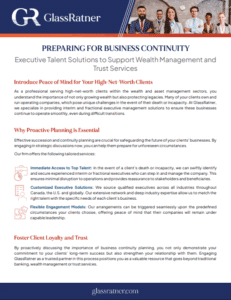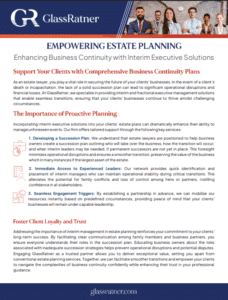In the world of family-owned businesses, the sudden death or incapacitation of an owner-operator can trigger a cascade of challenges that threaten the very foundation of the company. The emotional toll on the family, combined with legal complexities and operational upheaval, can create a perfect storm that jeopardizes the business’s future.
As the sixth article in our Dynamic Leadership: Interim and Fractional Executive Insights series, Christian Buhagiar explores the critical importance of pre-planning and how integrating interim executives can mitigate these risks, ensuring smoother transitions and maintaining company value during turbulent times.
Family Business Survival Rates Through Succession
Family business survival rates through generational succession are notably low, with statistics revealing a steep decline at each transition stage. Research across numerous family business studies consistently shows that roughly 30% of family-owned businesses survive the transition from the first generation to the second. Correspondingly, about 70% fail or are sold before this transition, highlighting significant succession challenges. Survival rates further decline into the third generation and continuity into the fourth generation and beyond is markedly rare.
Key factors contributing to these declines include conflict and disputes, lack of succession planning, governance issues, management challenges, and complex family dynamics.
According to PwC’s 2023 US Family Business Survey, research shows that whilst over 70% of family businesses want to keep the business within the family, only around 34% have a documented, robust succession plan in place. This gap sharply increases the risks of failure.
Successful multi-generational family businesses often embrace change, invest in professional management and succession planning, and create formal governance mechanisms. Without these strategies, family disputes, leadership gaps, and unclear strategic direction may undermine continuity.
These survival patterns hold true across geographic regions and business sizes, underscoring the challenging nature of sustaining family businesses through generations. The implications of a founder’s sudden death or incapacitation on family business succession can significantly affect these survival and transition rates.
The Implications of Sudden Transitions
The implications of a founder’s sudden death or incapacitation extend far beyond immediate operational challenges. These unexpected transitions can leave family businesses vulnerable, amplifying the risks associated with generational succession. The emotional and practical ramifications often intertwine, complicating decision-making and threatening the continued viability of the business. Understanding these challenges is crucial as they directly impact the survival prospects of family enterprises. Here are the key implications:
- Increased Vulnerability: Family businesses experiencing a sudden leadership transition due to the founder’s death or incapacity often face greater instability, leading to higher failure rates compared to planned successions. Studies indicate that nearly half of family business failures are linked to the founder’s death, with unexpected transitions particularly disruptive. In one study, research from the University of Connecticut Family Business Program reported that nearly half of family business failures are precipitated by the founder’s death, with 30% involving an unexpected death; on the other hand, there was only a 16% failure rate following orderly transitions.
- Lack of Preparedness: A sudden loss frequently leaves successors unprepared. According to the 2019 STEP Global Family Business Survey, 70% of family business owners have no formal succession plan. When a founder dies unexpectedly, successors may lack essential knowledge or authority to lead effectively, resulting in operational disruptions.
- Emotional Impact: The emotional toll on family members complicates decision-making and impairs effective leadership. Grief, confusion, and disputes can hinder overall business dynamics. Academic research demonstrates that the sudden passing of a founder can severely disrupt a family business’s performance. One extensive study found that firms lose an average of 60% of sales and cut 17% of jobs in the years following the founder’s unplanned death.
- Increased Conflict: Unexpected transitions often escalate family conflicts. A sudden demise can reignite unresolved issues, causing contested roles, power dynamics, and expectations, jeopardizing business continuity and leading to succession disputes.
- Leadership Gaps: Firms facing unplanned transitions may experience significant leadership gaps. Research consistently shows that a majority of family businesses – often estimated at around two-thirds – do not have a succession or contingency plan in place to address unexpected leadership transitions. Many successors may not be ready to take the reins or lack necessary support structures, increasing the risk of failure.
- Stakeholder Confidence: Stakeholders – including employees, clients, lenders, investors and suppliers – may lose confidence in the business after an unexpected transition. Research and expert analyses consistently identify that inadequate succession planning and insufficient communication during these times can erode stakeholder confidence, creating operational challenges and potentially jeopardizing key contracts.
It is crucial for family businesses to develop contingency plans and foster transparent communication to mitigate the risks tied to sudden transitions, which can decisively affect their sustainable operations and generational continuity.
The Value of External Interim Leadership Solutions
Considering the challenges posed by unexpected transitions, having external interim executives lined up and ready to be inserted is not just advantageous; it can be transformative for family-owned businesses. There are several key reasons why these external leaders are invaluable during critical moments:
- Immediate Leadership and Expertise: An external interim executive provides immediate expertise and decision-making capability, minimizing operational disruptions. With a seasoned leader at the helm, the business can continue to function smoothly, preserving relationships with employees, clients, and other stakeholders.
- Mitigating Family Conflicts: Appointing an external interim leader can help alleviate familial tensions. As a neutral party, they can navigate initial business decisions without the emotional baggage that may complicate internal dynamics. This ensures that critical decisions serve the company’s best interests rather than personal disputes.
- Streamlining Legal Processes: An interim executive can facilitate clearer communications and maintain operational continuity while the family deals with legal matters related to the estate. This arrangement helps stabilize the business and preserves value during potentially lengthy legal proceedings.
- Establishing a Contingency Framework: Pre-planning for the appointment of interim executives allows families to establish clear criteria for leadership transitions. By defining triggers for engagement and outlining the roles of interim leaders, families can react swiftly without the need for political maneuvering when a crisis occurs.
- Development of Internal Talent: External interim leaders often mentor internal staff during their tenure. They can help identify potential future leaders and facilitate leadership training, strengthening the organization’s long-term resilience.
- Holistic Crisis Management: External interim executives bring a wealth of experience from various industries, allowing them to integrate different strategies and best practices that can elevate the business during times of crisis. Their insights can help navigate challenges effectively, ensuring that the business remains focused on its strategic goals.
By integrating external interim leaders into their succession planning, family businesses can ensure continuity and stability during unexpected transitions. This proactive approach not only bolsters governance but also enhances the emotional readiness of family members, paving a smoother path to long-term succession success.
Case Study: A Trustworthy Transition in Family Business Continuity
In 2019, an accountant in our network reached out regarding a high-net-worth client facing serious health issues. This client managed a thriving company while overseeing intricate real estate holdings and a leveraged investment portfolio. With children from previous marriages, none were suitable successors for the business, making strategic succession planning urgent.
To ensure continuity, the client designated a trusted business advisor from our firm in his will. This advisor was set to step in as an interim executive if needed, maintaining critical relationships with legal and financial professionals. This arrangement allowed for seamless integration into the business framework, establishing ties with stakeholders in advance.
Upon the client’s passing, the pre-planned strategy kicked into high gear. The advisor stepped onto the company’s board, guiding executives and the family in strategic decisions that reflected the deceased client’s vision. He also mentored the deceased’s children, now shareholders, helping them navigate the complexities of winding down operations and managing family holdings.
This case exemplifies the importance of strategic pre-planning. By engaging a trusted interim executive before a crisis unfolded, the family maintained operational integrity and ensured a thoughtful transition during an incredibly challenging time. This serves as a vital reminder for family businesses to prioritize proactive succession planning and the value of experienced professionals in crisis management.
Conclusion
For family-owned businesses, the unexpected death or incapacitation of an owner-operator creates significant operational, legal, and emotional challenges. By proactively integrating interim executives into strategic pre-planning and establishing relationships with interim search firms, advisors can empower families to navigate these turbulent times with confidence.
At GlassRatner, we specialize in providing access to a network of experienced interim executives who can step in during critical moments. Our experience with family enterprises enables us to deliver tailored support, ensuring families are prepared to face challenges effectively. Together, we can enhance business continuity strategies, ensuring swift reactions and smoother transitions for families during challenging times.
Contact us today to explore how we can support your planning initiatives.
Browse more resources on Wealth Management and Estate Planning.
Discover More
Explore the other articles in our Dynamic Leadership: Interim & Fractional Insights series:
- Embracing Flexible Leadership: Navigating the Future of Executive Talent
- Demystifying Interim and Fractional Executives: Embracing Change for Strategic Advantage
- The Pitfalls of Internal Interim Executives: Why Hiring Externally Yields Better Results
- Elevating Business Success: Why Interim and Fractional Executives Are Your Optimal Solution Over Hiring Traditional Consultants
- Accelerating Growth: The Strategic Advantage of Fractional Executives for Startups and Scaling Companies
Our Contributors
Charlene Bergman is the Managing Director & Partner of the Executive Search & Interim Management practice at GlassRatner. Her expertise lies in building long-term relationships by supporting clients to meet their corporate and strategic business goals and candidates by impacting their careers and realizing their aspirations. Charlene can be reached at [email protected] or at 437.294.4609
Christian Buhagiar is a Principal in GlassRatner’s Executive Search & Interim Management practice. He co-leads the interim management practice with a focus on interim and fractional executive roles across all major industries and functions, including the private equity (PE) space. Christian can be reached at [email protected] or at 437.294.4681
Steve Rosen is a Partner in the Executive Search & Interim Management practice at GlassRatner. He brings a depth of experience from a long career in finance and accounting that began with a 15+ year career with a Fortune 50 CPG firm, followed by leadership roles in the education, transportation, and market research industries. Steve can be reached at [email protected] or at 437.294.4653



